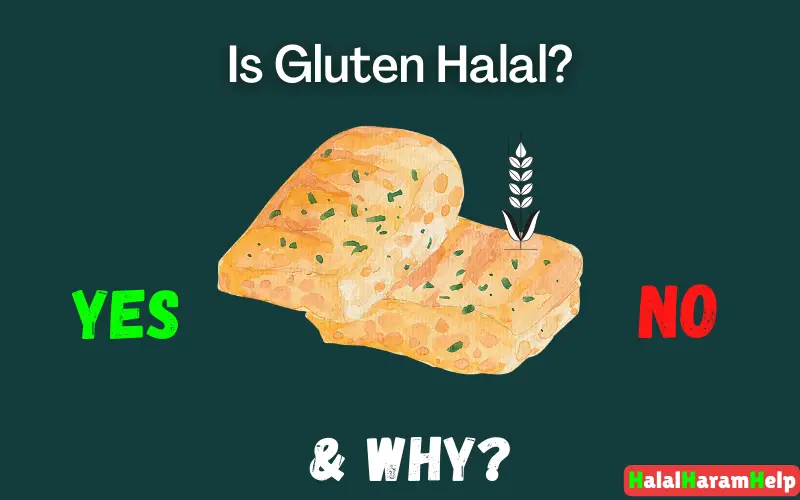Gluten, the protein complex found in wheat and other grains, has become a ubiquitous ingredient in our modern diet.
However, for those following halal dietary principles, the question arises is gluten halal?
This inquiry delves beyond the familiar concerns of meat and into the intricate world of food processing and ingredient sourcing.
Understanding the halal status of gluten involves exploring how it’s handled from farm to table, ensuring it meets the rigorous standards of Islamic law.
So let’s unravel the complexities and implications of gluten in the context of halal eating practices.

Is Gluten Halal?
Yes, gluten can be halal, but it depends on several factors related to its source, processing, and potential contamination.
There are both halal and haram glutens available in the market so you should know about it in detail.
Understanding Halal Requirements:
In Islamic dietary laws, halal refers to what is permissible or lawful for Muslims to consume. This includes not only meat but also various food ingredients and products. For gluten to be considered halal, it must meet specific criteria.
Source of Gluten:
Gluten is naturally found in grains such as wheat, barley, rye, and oats (in some interpretations). These grains are considered halal as long as they are not contaminated or mixed with haram (forbidden) substances during farming or processing.
Contamination Concerns:
One of the primary concerns regarding the halal status of gluten is contamination. Cross-contact with haram substances during processing or packaging can render gluten-containing products non-halal.
This is particularly important in facilities that process multiple ingredients, where shared equipment or production lines may compromise halal integrity.
Halal Certification:
To ensure compliance with halal standards, many food manufacturers obtain halal certification for their products.
This certification verifies that the entire production process, including sourcing of ingredients like gluten, meets halal requirements. Look for labels or symbols from recognized halal certification organizations to identify halal gluten products if you’ve doubts.
Checking Labels and Ingredients:
For Muslims adhering strictly to halal guidelines, it’s essential to check food labels for ingredients derived from grains and ensure they are certified halal. Some products may explicitly state their halal status, assuring consumers.
You might also like is pectin halal.
FAQs
Q1. Is gluten halal or haram?
A: Gluten itself is not inherently halal or haram. Its halal status depends on how it’s sourced, processed, and whether it’s contaminated with haram substances.
Q2. Does gluten have gelatin?
A: No, gluten does not contain gelatin. Gelatin is a protein obtained from collagen in animal skin and bones, typically pork or beef.
Q3: Does gluten have pork?
A: No, gluten itself does not contain pork. Gluten is a protein found in wheat and related grains, whereas pork is derived from pigs.
Also learn is day trading halal.
Conclusion
In conclusion, while gluten itself is not inherently haram, its halal status depends on careful consideration of its source, processing methods, and potential contamination.
By understanding these factors and being vigilant about checking labels and certifications, individuals can make informed choices that align with their dietary beliefs and practices by Islamic principles.
I hope your query, is gluten halal or haram is clear now. If you’ve any other doubt feel free to comment below.


